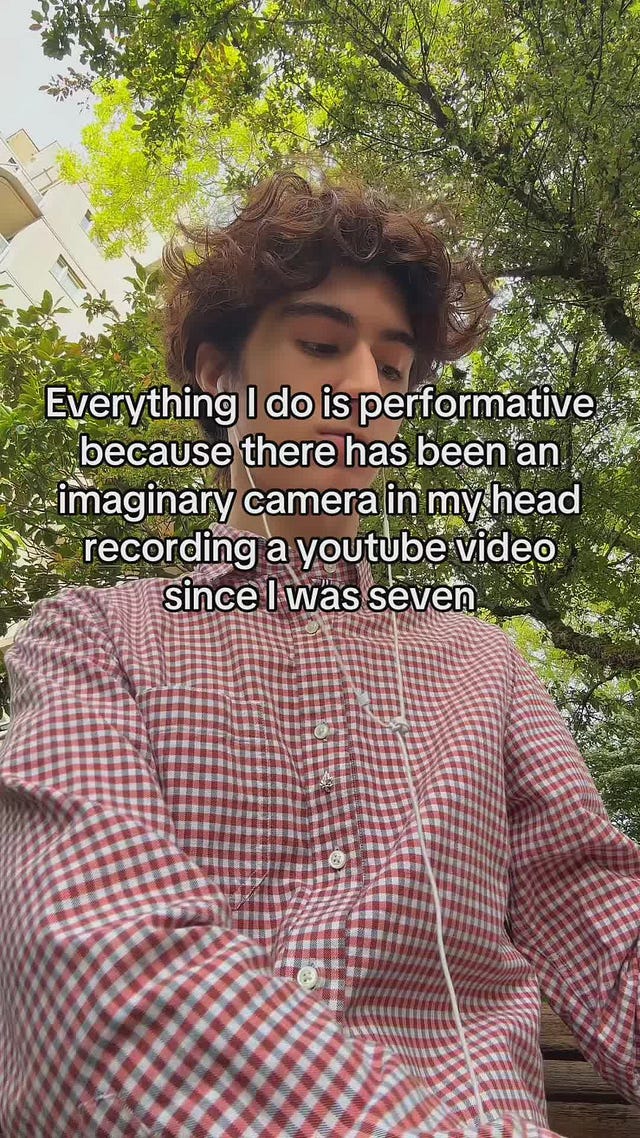Performative Culture and Real Connection
Gen Z lives in an exhausting performance culture, and they need Biblical rest and real relationships
I don’t use TikTok, but months ago, I saw a link to the following TikTok from a fellow Substacker who follows and writes on all things Gen Z.
 Tiktok failed to load.
Tiktok failed to load.Enable 3rd party cookies or use another browser
Ever since, I’ve been thinking it deserves some reflection and Biblical engagement.
To start with, there’s the caption in the video: “Everything I do is performative because there has been an imaginary camera in my head recording a youtube video since I was seven”
Then there’s the text caption below: “I am my own spectacle and I perceive myself in the third person #performative”
Going further, notice the comments:
“how do you get rid of this feeling”
“it’s honestly an exhausting way to live but the show quite literally must go on”
“Yes I literally talk to myself I sound schizophrenic”
“I motivate myself to do things by pretending it’s a tutorial to my invisible fans”
“I literally go like ‘hey guys so today I’m going to unpack’ and it’s just me”
and so on…
The TikToker says this has been going on since he was seven. His worldview was being shaped by social media even at that age (which I have a lot of questions about, but that’s another matter). It’s not just the content of what people are posting online that has formed him and so many others who relate in the comments — they’re not just getting their news, learning recipes and life hacks, or being influenced to hop on trends and buy new products. They’re also absorbing a culture in which it’s normal for people to constantly be performing for an online audience. The expectation is to always be curating and narrating your life for consumption.
It makes me wonder how youth leaders are currently seeing this play out in their youth ministries (I’m genuinely curious because I’m currently not regularly involved in the lives of teens). Are they seeing this in students during relational ministry? Are they noticing students who act out in youth group settings because in their minds they are performing to an online audience (distinct from the real people they are with in the moment)? I can imagine students carrying the thought of their “fans” in their minds even while they attend youth programs.
When you’ve been shaped to think this way, you may come to think of yourself primarily in relation to an online audience. Who you are, who you should be, and what you should do will flow out of your relationship with a disembodied audience, whose reactions you will not get to see and experience in real time and space. As one commenter says, this is an exhausting existence, yet many think it is necessary — again, because this is the cultural norm they know.
This is not the way we were designed to flourish. We are not primarily performers for an online audience — and thank God, because that can be not only exhausting, but also lonely and filled with the constant pressure to entertain. We are primarily humans in relationship with God, self, and others around us. We will not thrive when we are always asking, “How can I entertain?” Instead, I think we are meant to focus more on a question like, “How can I connect and love?” — to be relational, not performative.
The extent to which we can connect with and love the real, embodied people around us will also affect the extent to which we can do that with God. And it will also bring us into a place of rest, in contrast to the exhaustion of this performative way of thinking. In fact, even neuroscience tells us this — for when we are in a restful state in our nervous system, we are also in relational mode. We’re not protecting ourselves or selling ourselves to others; we’re just looking to genuinely connect.
The God of the Bible invites us into rest, and that invitation is also an invitation into relationship and connection — not to perform or entertain, but to know and love. This might be a message the younger generations will need to hear and experience over and over.




